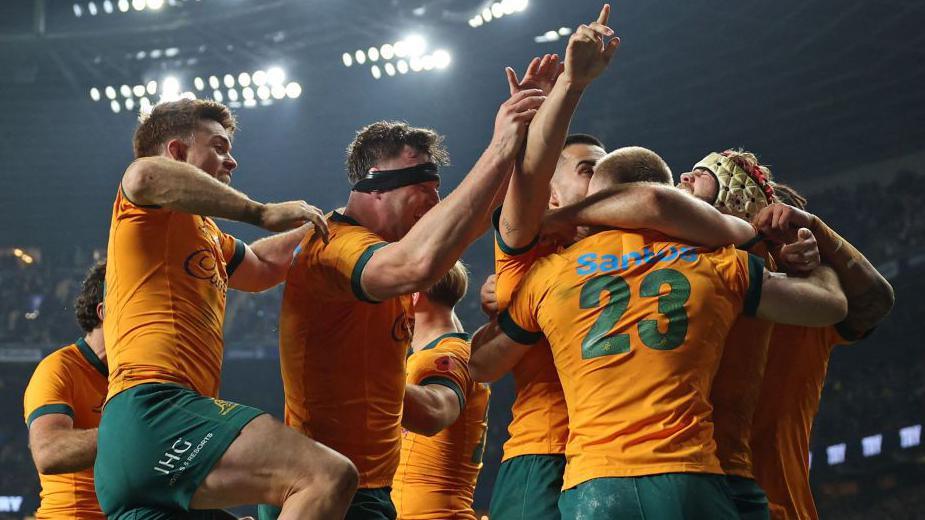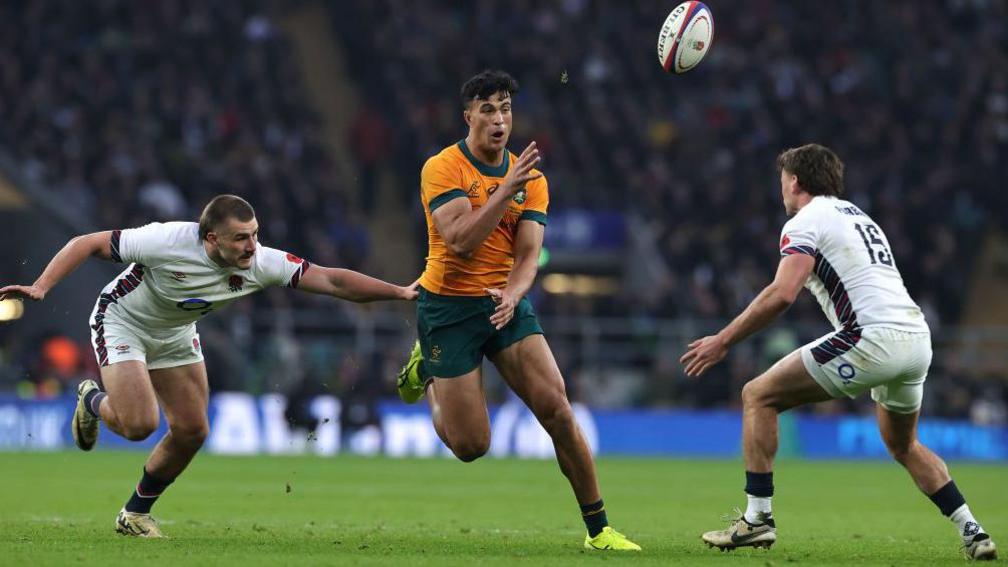Unforgivable to concede 42 points at home - George

Max Jorgensen's 84th-minute try snatched victory for Australia against England
- Published
England conceding 42 points at home in their Autumn Nations Series defeat by Australia is "unforgivable", says captain Jamie George.
Maro Itoje's 78th-minute try looked to have ended a run of three successive narrow defeats for Steve Borthwick's side.
However, replacement wing Max Jorgensen stole the game four minutes into injury time at Twickenham's Allianz Stadium.
Both sides scored five tries in an rollercoaster game and George highlighted England's leaky defence - they missed 35 tackles - as a major factor, but also admitted his team "took their foot of the gas" in the first half.
"Some of it defensively came down to a loss of collision and it is hard for me to say that after a loss at home," George told BBC Sport.
"We were not physical enough and when we gave the Wallabies enough momentum it's hard to stop them at times."
The last time England conceded more than 40 points at Twickenham was when they suffered their record home defeat, 53-10 by France, during last year's Six Nations.
England had led Joe Schmidt's Australia by 12 points after two first-half tries from Chandler Cunningham-South, but surrendered that advantage by half-time.
The hosts - under new defence coach Joe El-Abd - failed to live with Australia's dangerous attacking talent.
"Leaking 42 points at home is unacceptable and a large part of that is down to loss of collisions," George added.
"Australia got front-foot ball and they have got pretty good players out wide who made us look vulnerable.
"We are very proud in our defence. We massively believe in the system that we have but there are going to be some clips that will be difficult to watch because we needed to be more physical and make our tackles.
"Sometimes in a Test match like that, you think the job is done. We took our foot off the gas."
Replacement wing Ollie Sleightholme had put England 30-28 up heading into the final 10 minutes, before the visitors snatched the lead back with five minutes to go through Andrew Kellaway.
And despite reclaiming the advantage through Itoje, England were unable to close out the game from the resulting restart as they fell to a sixth defeat from 10 matches this year.
However, it was a huge win for an Australian side ranked ninth in the world.
"It is one of those days that the crowd enjoy and the coaches not so much," Schmidt told BBC Sport.
"Harry Wilson was immense and Rob Valetini was incredibly physical and his repeated efforts to take the ball forward were really positive for us.
"Fraser McReight got on the ball and around the ball, linking with other ball players."

Joseph-Aukuso Suaalii impressed in his first professional game of rugby union
'We are all gutted'
England also conceded 17 turnovers and made 14 handling errors, statistics which Borthwick said handed the visitors opportunities.
"Every side has talent and pace at this level and you will be punished," the England head coach added.
"The opportunities and points we gave them was because they had too much space as we handed the ball over to them.
"We are all gutted, as will be the England supporters. I am incredibly disappointed as are all the players.
"We will be learning from all of this, but the pain of this is something we didn't want to go through.
"The first 20 minutes is how we wanted to play and at times later in the second half."
Borthwick confirmed flanker Tom Curry, who suffered a first-half head knock, will miss next Saturday's visit of world champions South Africa.
'This continuous nightmare of not closing out a match'
The result draws similarities with last weekend's 24-22 defeat by New Zealand when England conceded a 76th-minute try and blew an eight-point lead.
It is the fourth game in five matches that Borthwick's side have fallen on the wrong side of the final play, following two close Tests against the All Blacks in July and a 33-31 defeat by France in their final game of this year's Six Nations.
Former England wing Ugo Monye said the defeat against Australia is like "groundhog day" and that being "unlucky" is no longer an excuse.
"The ending is this continuous nightmare of not closing out a match," he told TNT Sports.
"It is a real problem and not unlucky any more. This is a trend that has stuck with England."